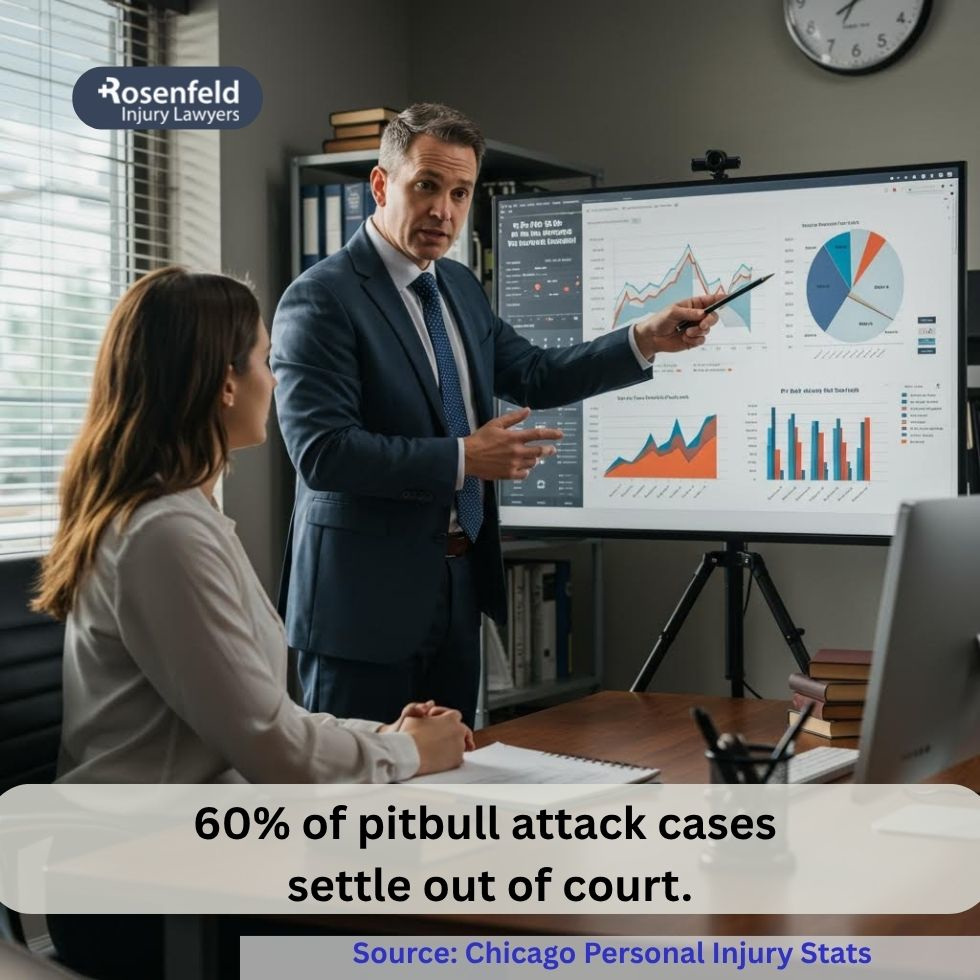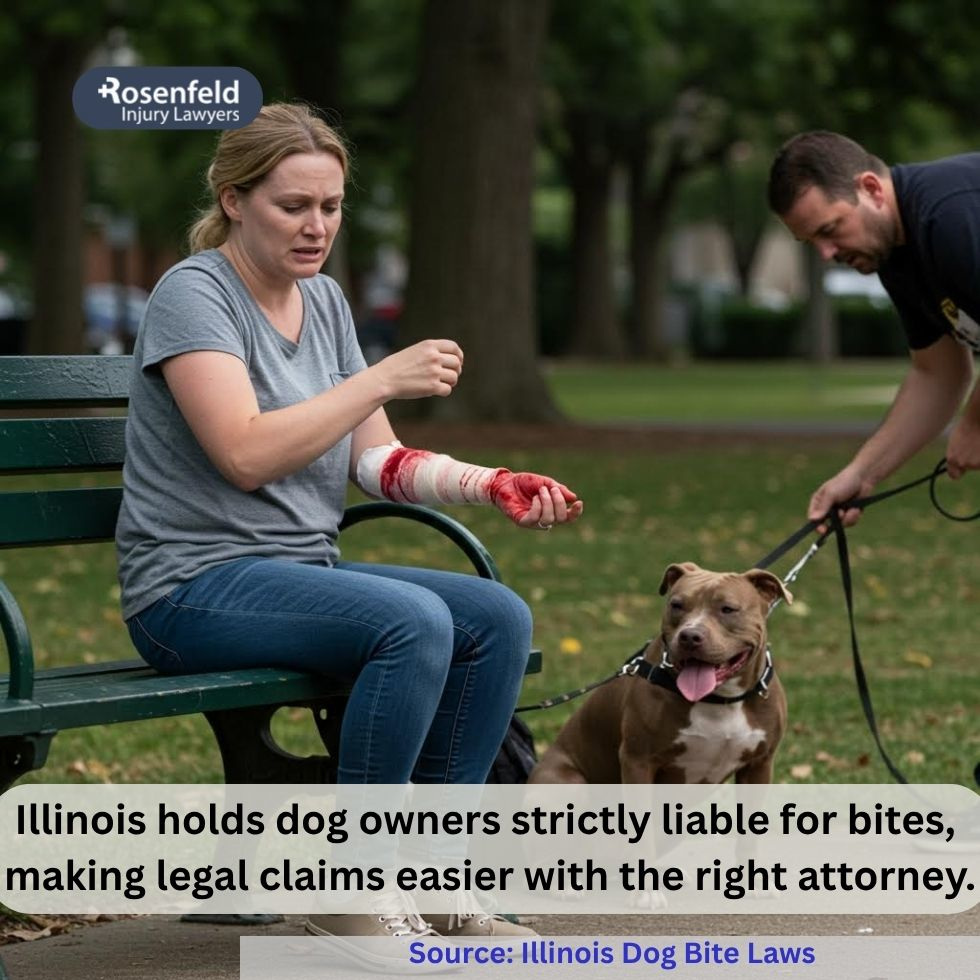- 24/7 Free Consultation: (888) 424-5757 Tap Here To Call Us
Chicago Pitbull Attack Statistics

Chicago pit bull attack statistics suggest that these dogs are more dangerous than other dog breeds, even those of similar size and strength. However, dog bite statistics may not always provide the complete picture due to the way dog breeds are categorized and how statistics are compiled.
If you or a loved one has suffered dog bite injuries from a pit bull or any other breed, our dog bite attorneys are here to help. Contact us for a complimentary consultation to discuss your legal options.
Defining the “Pit Bull” Dog Breed Category
While many believe “pit bull” is a breed, it is actually an umbrella term for several different breeds. These include the American Pit Bull Terrier, American Staffordshire Terrier, Staffordshire Bull Terrier, American Bully, and American Bulldog. Additionally, mixed breeds may be included in the category as “pit bull-type dogs.”
This term can make it difficult to determine which pit bull breeds are the most dangerous, especially since the victim may not always know the dog’s breed.

Public Perception vs. Reality: The Pit Bull Controversy
There are strong public opinions around pit bull breeds due to media coverage of fatal attacks and the breed’s use in dog fighting rings. Pit bull-type dogs were originally bred to bait bulls for public entertainment, hence the name “pit bull.” Today, they are commonly used in dogfighting rings.
Due to this genetic history, some pit bulls may exhibit dog-aggressive behavior; however, aggressive behavior toward humans is not part of the breed standard, according to the United Kennel Club. The American Society for the Prevention of Cruelty to Animals released a position statement on pit bulls, noting that dog-aggressive breeds are no more likely to be aggressive toward humans than any other dog.
Responsible dog ownership can significantly decrease the risk of dog attacks. A survey of veterinary medical professionals published in the International Journal of Environmental Research and Public Health found that animal staff believed Chow Chows posed a higher bite risk than pit bulls, who were considered to have a moderate risk.
Dog owners who take their dogs to the vet are more likely to express interest in behavioral modification and safe dog handling, which could correlate with a decreased bite risk and lower perceptions of danger by veterinary professionals.
National Statistics on Dog Attacks Involving Pit Bulls: Fatalities
A report by Merritt Clifton, hosted on DogsBite.org, analyzed both non-fatal and fatal attacks by pit bulls between September 1982 and December 2011. This report found that during the study period, there were 213 fatal dog attacks by pit bulls.
The report also notes that there was a jump in dog bite fatalities following the Michael Vick case, where a former NFL football player was found running a dogfighting ring.
However, there are concerns about Merritt Clifton’s work. Critics have noted that his sources are drawn from media reports, which do not accurately represent the total number of dog attacks, as opposed to hospital records. Media reports may also not correctly identify the breed.
DogsBite.org advocates for breed-specific legislation. The website also posts articles specifically about the “pit bull problem,” such as when two pit bulls killed a 61-year-old man in Belleville, IL.
Data on Non-Fatal Dog Bites and Injuries: Comparing Pit Bulls to Other Breeds
The American Veterinary Medical Association (AVMA) notes that the breeds most likely to bite include German Shepherds (GSDs), mixed-breed dogs, pit bulls, Rottweilers, and Jack Russell Terriers. Other top biting breeds include Chow Chows, spaniels, collies, Saint Bernards, and Labrador Retrievers.
This AVMA study notes that pit bulls are overrepresented in cases that resulted in catastrophic injuries or death, but also notes that this may be due to the prevalence of pit bulls in a victim’s community and reporting biases.
A 2020 study in Plastic and Reconstructive Surgery reviewed 41 articles published between 1971 and 2018. This found that GSDs were most likely to bite, followed by pit bull-type dogs.
In “A Community Approach to Dog Bite Prevention,” the AVMA states that it is inaccurate to identify “dangerous breeds” because not all dog bites are recorded, and breeds may be misidentified. Moreover, it is impossible to know the true population of a certain breed in an area because not all dogs are licensed with the city.
The Centers for Disease Control and Prevention ceased collecting breed-specific data in 1998 for several reasons, including the absence of a central repository for dog bite records and the fact that breed identification was not always accurate.
Severity of Injury: Do Pit Bull Attacks Cause More Damage?
A report in the Annals of Surgery found that pit bull attacks were associated with higher injury severity, higher risk of death, and higher median hospital charges.
An article published in the International Journal of Surgery states that pit bull terrier attacks are more likely to result in severe morbidity and catastrophic damage. The authors note that stronger dog control laws, public education, and responsible pet ownership can help prevent these attacks.
A study published in Clinical Pediatrics implicated pit bulls in over half of surgical interventions, and they were 2.5 times more likely to bite in multiple locations.

Pit Bull Attack Statistics Involving Children
DogsBite.org states that between 1982 and 2011, there were 876 attacks on children by pit bulls. As mentioned, these statistics are compiled from media sources and may not accurately represent the actual number of pit bull bites.
According to the AVMA, more than half of dog bite victims are children under the age of 12. An analysis of pediatric facial dog bites published in Craniomaxillofacial Trauma & Reconstruction found that 89.9% of the dogs involved in attacks were known to the victim, such as family dogs.
Of the 366 cases where the breed was known, 11 were pit bulls, representing 3% of all cases. The most common dog represented was a mixed breed, which can include popular family pets like doodle mixes.
The other most common biting dogs were Labrador Retrievers, Rottweilers, German Shepherds, and Golden Retrievers. This trend is consistent with the fact that family pets are more likely to attack a child, as Labrador and Golden Retrievers are commonly recommended for families.
In an older study published by Pediatrics, 94% of attacks by pit bulls on children were unprovoked, and 67% of those attacks came from freely roaming animals that may not have been known to the victim.
Statistics on Pit Bull Attacks on Other Dogs and Animals
A report on Animals 24-7, which is run by the same author as DogsBite.org, states that pit bulls killed 38,000 other animals in 2017. According to the source, pit bulls were responsible for 92% of fatal attacks on other dogs, 74% of attacks on farm animals, and 96% of attacks on cats.
However, this source does not cite any academic articles or explain the origin of these statistics.
Factors Influencing Dog Attack Statistics
Several factors influence the reporting and statistics of dog bite injuries. Understanding these is important before making judgments about a dog breed’s potential for violence.
Neglectful breed ownership, poor training, or a lack of socialization can lead dogs to become aggressive. The AVMA states that pit bull owners may be more likely to engage in criminal or violent activity, which can increase the risk of aggression.
Unfortunately, many pit bulls and mixed-breed dogs are not temperament tested by breeders. This irresponsible breeding contributes to the homeless dog population and can make the dogs more prone to behavioral issues due to poor genetics.
Many dog bite victims do not personally know the dog that attacked them, meaning they may misidentify the breed if it has pit bull-type traits. Even professionals may incorrectly assume that a certain dog is a pit bull mix, which leads to misreporting.
Lastly, pit bulls and mixes are very popular breeds in certain areas. The more of a breed present in a city, the more likely it is that it will be represented in bite statistics.

Illinois Dog Bite Law: Strict Liability Explained
The Illinois Animal Control Act defines a dangerous dog as any dog that bites or attacks without justification. It also notes that the dog owner bears strict liability for any dog attack on a person who is peaceably conducting themselves in a place where they have a right to be, regardless of the dog’s bite history or the owner’s negligence.
According to the Illinois Supreme Court case Hayes v. Adams, this is to “encourage tight control of animals in order to protect the public from harm.” It also removes the “one free bite” loophole present in other jurisdictions, where dogs must have a previous bite history to be considered dangerous animals.
Does Illinois Have Breed-Specific Laws for Pit Bulls?
Illinois bans municipalities from passing breed-specific legislation. A dog can only be deemed vicious or dangerous based on a veterinary assessment and observation.
Additionally, Illinois prohibits insurance companies from raising premiums based on a dog’s stated breed. However, they can raise premiums if the dog has been assessed as a dangerous dog.
Chicago and Cook County Ordinances Regarding Pit Bulls
In Chicago, pit bull owners are subject to the same rules as other dog owners. These include:
- Owners must respect leash laws and keep their dogs restrained when outside their homes or fenced yards (7-12-030).
- All dogs older than four months must be licensed (7-12-140).
- Every dog, cat, and ferret must be vaccinated against rabies (7-12-200).
- Any dog that kills a person will be subject to euthanasia after an investigation (7-12-050).
- Dangerous dogs must be muzzled when outside of the home, and owners must warn the public that their dog is dangerous (7-12-050).
- A dog that is not found to be dangerous because of extraneous circumstances, such as being provoked, must still be confined and muzzled when off their property (7-12-050).
- If a dog bites someone, the bite must be reported, and the dog must be confined for 10 days to check for rabies unless the owner can provide a rabies certificate (7-12-090).
How Statistics and Local Laws Impact Dog Bite Cases Involving Pit Bulls
A plaintiff may use pit bull statistics to demonstrate that these dogs are more dangerous than other breeds, especially in terms of bite severity. Additionally, understanding local laws can prove that the owner was negligent, such as failing to properly muzzle a dog with a history of biting. Working with a personal injury attorney in Chicago can ensure that all the right evidence is presented to the jury.
Proving Liability in a Chicago Pit Bull Attack Case
Under the Illinois Animal Control Act, owners are strictly liable for any dog bite, regardless of breed. An attorney must prove that the victim was lawfully and peaceably occupying the area at the time the bite occurred. The owner may also be considered negligent if their animal was off-leash in a public space.
Are Pit Bulls Legally Considered an Aggressive Dog Breed in Illinois?
No Illinois state law designates pit bulls as inherently aggressive. State law also bans municipalities from passing specific legislation that targets pit bulls (510 ILCS §5/15).
Defenses in Pit Bull Attack Lawsuit
The Illinois Animal Control Act allows dog owners to argue that the animal was provoked into biting or that the victim was trespassing on the owner’s property. This is why victims must work with an experienced Chicago dog bite lawyer to prove that the victim did nothing to warrant the attack.

Compensation for Victims of Dog Attacks
Damages that victims may receive include:
- Medical expenses, such as for infection treatment, surgery, or counseling
- Lost wages
- Pain and suffering
- Out-of-pocket medical expenses
- Loss of earning potential
- Scarring or disfigurement
- Loss of enjoyment of life
In a wrongful death case, the family of victims killed by dogs can also receive funeral expenses as well as compensation for grief.
Why You Need a Lawyer Experienced in Chicago Dog Bite Cases
Legal assistance is crucial in a dog bite case. A lawyer can assist you in understanding Illinois liability laws, including premises liability, accurately evaluate damages, and guide you through the legal process.
Investigating Pit Bull Attacks and Owner Negligence
Our personal injury attorneys will gather ample evidence to prove that the attack was unprovoked and that the owner is responsible. This can include:
- Veterinarian reports
- Witness statements
- Medical records
- Veterinary records
- Dog behavior assessments
- Photos and videos
- Evidence of prior aggression
- Dog licenses and rabies certificates
Countering Breed Bias in Legal Proceedings
A good lawyer will focus the case on the specific facts, liability laws, damages, and the owner’s responsibility under the law rather than sensationalizing about pit bulls. However, it’s also important to acknowledge statistics and local rules. We will take a balanced approach to your case, utilizing high-quality resources such as medical journals and expert testimony, thereby improving your chances of success.
Frequently Asked Questions About Pit Bull Attacks and Statistics in Chicago
What Percentage of Dog Attacks in Chicago Involve Pit Bulls Specifically?
According to a 2012 Chicago Tribune infographic, pit bulls were responsible for 44.3% of dog bites in the city.
Does Owning a Pit Bull Automatically Make Someone Liable if It Bites Under Illinois Law?
In Illinois, the animal’s breed does not factor into whether the owner is considered liable. Rather, state law considers whether the bite was justified, such as if the animal was in pain, the victim provoked the animal, or the victim was trespassing.
Are Homeowners’ Insurance Policies Less Likely to Cover Claims Involving Pit Bulls?
In Illinois, homeowners’ insurance is not allowed to consider a dog’s specific breed when determining premiums or covering claims. Instead, they must rely on the dog’s history and temperament to decide whether it is dangerous, which could lead to higher premiums or denied claims.
What Are the Specific Pit Bull-Related Rules Enforced by Chicago Animal Care and Control?
Chicago does not have specific rules for pit bulls, but these dogs are subject to the same regulations as other dogs. These include being leashed while in public, being licensed with the city, and being vaccinated against rabies. Ordinances also require that dog bites be reported, and any dog that bites a human must be impounded and monitored by a veterinarian for a period of 10 days.

Does the Data Show Pit Bulls ‘Snap’ Without Warning More Than Other Dogs?
Yes, data published in Pediatrics shows that 94% of recorded attacks by pit bulls on children were unprovoked, while 67% were from freely roaming dogs.
Consult a Dog Bite Attorney Near You!

Our law firm maintains a 98% success rate and operates on a contingency fee basis, meaning you owe us nothing unless we successfully resolve your case. Call us at (888) 424-5757 or use our online contact form to schedule your free consultation with a skilled dog bite lawyer.
All content undergoes thorough legal review by experienced attorneys, including Jonathan Rosenfeld. With 25 years of experience in personal injury law and over 100 years of combined legal expertise within our team, we ensure that every article is legally accurate, compliant, and reflects current legal standards.







